I have advocated for years that as adults we need to be careful of what we express in front of our young people, because they take things literally. Their young minds are not fully developed and capable of doing a lot of critical thinking.
As an example, many of our young people have grown up hearing people my age say, "If that person does this or that, I'll get my gun and blow their brains out."
Well guess what? Our young people are now doing that at a rate that make our city more dangerous than Iraq. We are seeing young men killed at a rate that, if was the Klan, the community leaders would be in an uproar.
But because it's black-on-black crime, we get the occasional whimpers from the preachers and the nodding in agreement by the politicians who don't take the lead on ending the violence.
And I make that claim based on a simple premise. Tell me which black politician has made it his or her stance to always speak out on the murders and killings going on in the black community?
I'll take a nap while you try to think of a name, because I know that none of them immediately come to mind. Sure, there are those that make occasional statements, but it's not something where they've taken the lead and are the first person the media would go to in order to get a sound bite.
Well, there is a new phenomenon that is occurring, where our young people have heard us say something so much that they are now taking those words literally. For years when someone finally passes away (perhaps they had been ill or suffering in some other form or fashion), we would offer words of condolences to the family members.
We would tell the family that the suffering was now over and that their deceased love one was now in a "better place." Well our young people have heard us, but they only heard the second half of the message.
I first noticed this the other day when there was an interview on television regarding Reggis Washington. On Friday April 2, at 7:35 p.m. at 69th and Wabash, there was a call to police about shots being fired. When they police arrived, they found Reggis face down on the ground, shot in the back.
When they interviewed a friend of his, the young man stated, "He's (Reggis) in a better place now!" It was shocking and surprising to hear our young people take words of condolences and make them words of statement and fact.
Yes, death is the inevitable end to life. And it is hopefully a place where our souls can find a better place after living this life. But it is not the journey or decision for others to make - to give or send us to the "better place." We cannot allow our young people to warp the meaning and, therefore, validate the murders and killing by claiming that the deceased is now in a "better place."
Because if death is such a better place, then the killers and murders can do us all a favor and end their own wretched lives and put themselves into a "better place." But we know that ain't happening.
We need to talk with our young people and challenge them when they speak so cavalierly that death "is a better place." If it is, then why are so many scared to take a stand that might lead to their death and journey to that "better place?"
Why do religious leaders who profess to speak to God and know about heaven surround themselves with security guards so they can remain on this earth and avoid getting to that "better place?"
This is not about the religious connotation to death. It's the reality that our final destination should not be the legitimate excuse to give other the right to end our lives. And our anger should be directed against those killers and murders. Otherwise, what our young people are doing is inadvertently validating the killing, since the end result is the "better place."
You Finished The Book - Now What Did You Think
13 years ago

No comments:
Post a Comment